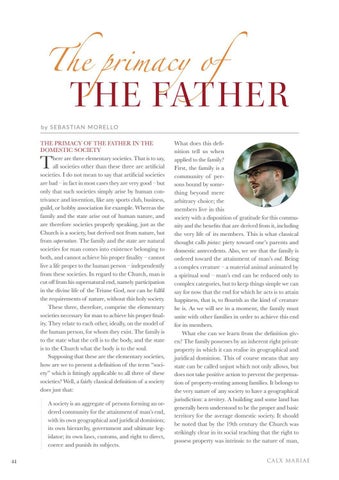The primacy of
THE FATHER
b y S E B A S T I A N M O R E L LO
THE PRIMACY OF THE FATHER IN THE DOMESTIC SOCIETY here are three elementary societies. That is to say, all societies other than these three are artificial societies. I do not mean to say that artificial societies are bad – in fact in most cases they are very good – but only that such societies simply arise by human contrivance and invention, like any sports club, business, guild, or hobby association for example. Whereas the family and the state arise out of human nature, and are therefore societies properly speaking, just as the Church is a society, but derived not from nature, but from supernature. The family and the state are natural societies for man comes into existence belonging to both, and cannot achieve his proper finality – cannot live a life proper to the human person – independently from these societies. In regard to the Church, man is cut off from his supernatural end, namely participation in the divine life of the Triune God, nor can he fulfil the requirements of nature, without this holy society. These three, therefore, comprise the elementary societies necessary for man to achieve his proper finality. They relate to each other, ideally, on the model of the human person, for whom they exist. The family is to the state what the cell is to the body, and the state is to the Church what the body is to the soul. Supposing that these are the elementary societies, how are we to present a definition of the term “society” which is fittingly applicable to all three of these societies? Well, a fairly classical definition of a society does just that:
T
A society is an aggregate of persons forming an ordered community for the attainment of man’s end, with its own geographical and juridical dominion; its own hierarchy, government and ultimate legislator; its own laws, customs, and right to direct, coerce and punish its subjects. 44
What does this definition tell us when applied to the family? First, the family is a community of persons bound by something beyond mere arbitrary choice; the members live in this society with a disposition of gratitude for this community and the benefits that are derived from it, including the very life of its members. This is what classical thought calls pietas: piety toward one’s parents and domestic antecedents. Also, we see that the family is ordered toward the attainment of man’s end. Being a complex creature – a material animal animated by a spiritual soul – man’s end can be reduced only to complex categories, but to keep things simple we can say for now that the end for which he acts is to attain happiness, that is, to flourish as the kind of creature he is. As we will see in a moment, the family must unite with other families in order to achieve this end for its members. What else can we learn from the definition given? The family possesses by an inherent right private property in which it can realise its geographical and juridical dominion. This of course means that any state can be called unjust which not only allows, but does not take positive action to prevent the perpetuation of property-renting among families. It belongs to the very nature of any society to have a geographical jurisdiction: a territory. A building and some land has generally been understood to be the proper and basic territory for the average domestic society. It should be noted that by the 19th century the Church was strikingly clear in its social teaching that the right to possess property was intrinsic to the nature of man, CAL X M A R IA E











